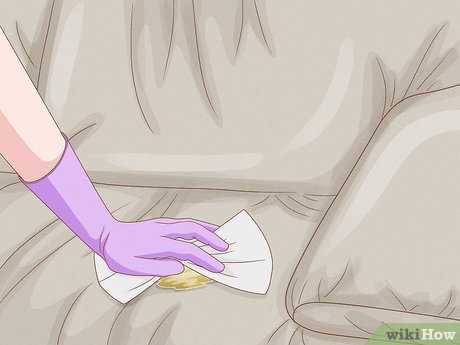



For those dealing with unfortunate incidents on their favorite furniture, an immediate solution involves using a mixture of white vinegar and water. Combine equal parts in a spray bottle, lightly mist the affected area, and gently blot with a clean cloth. This helps neutralize unpleasant odors effectively.
Another effective method is utilizing baking soda. Sprinkle it generously over the area, allowing it to sit for several hours or overnight. Once the time has passed, vacuum the residue to remove both the baking soda and the lingering scent.
Lastly, consider using enzymatic cleaners specifically designed to tackle organic stains. These products break down the compounds that cause bad odors, ensuring a thorough clean. Follow the instructions on the label for optimal results, and always test a small area first to avoid damage to your cherished items.
Assessing the Damage: Identifying Areas Affected by Cat Urine
First, examine the surface carefully. Look for discoloration or staining, which can indicate where the liquid has soaked in. Pay attention to any dark patches or areas that feel more rigid than the surrounding material.
Next, use your nose. Sniff around suspected spots. Areas with a stronger odor may require more attention. Don’t forget to check seams and crevices; urine often seeps into these hidden places.
Consider the texture as well. If certain sections feel sticky or tacky, they may be affected. Run your fingers over different areas to feel for changes.
Finally, take note of the furniture’s age and type of finish. Older materials or specific treatments may react differently. Document all findings, as this will guide the cleaning process and help in determining the right products for restoration.
Choosing the Right Cleaning Solution for Leather
For tackling those stubborn odors, a mixture of water and vinegar can work wonders. Combine equal parts of both in a spray bottle for a natural remedy. Lightly mist the affected areas, ensuring that the solution doesn’t soak the material.
Another option is to use specialized leather cleaners. Look for products specifically designed to neutralize odors and clean without damaging the surface. Always test any cleaner on a hidden area first to check for adverse reactions.
Enzyme-based cleaners are particularly effective. They break down organic residues, which helps eliminate lingering odors. Apply according to the manufacturer’s instructions, allowing it to sit for the recommended time before wiping it away.
After cleaning, consider applying a leather conditioner. This not only restores moisture but also creates a barrier against future stains and odors. Choose a conditioner that is compatible with your specific type of material.
Always avoid harsh chemicals or abrasive materials, as these can cause permanent damage. Gentle solutions will preserve the integrity of the surface while effectively addressing any unwanted scents.
Preparing Your Leather Sofa for Cleaning
Before tackling the issue, ensure the upholstery is ready for treatment. Remove any cushions or throws, as these can trap odors and moisture. Dust the surface with a soft cloth to eliminate debris that may interfere with the cleaning process.
Gather Necessary Supplies
Collect the following items:
- Soft cloths
- Leather conditioner
- Cleaning solution specifically for upholstery
- White vinegar
- Baking soda
Test Cleaning Solutions
Always conduct a patch test on an inconspicuous area before applying any cleaning solution to the entire surface. This helps avoid discoloration or damage.
| Item | Purpose |
|---|---|
| Soft Cloths | Wipe down surfaces without scratching |
| Leather Conditioner | Maintain suppleness after cleaning |
| Cleaning Solution | Break down stains and odors |
| White Vinegar | Neutralize odors effectively |
| Baking Soda | Absorb lingering scents |
For additional tips on maintaining a clean environment, check out this guide on how to lower the nitrate level in a fish tank.
Step-by-Step Guide to Cleaning Cat Urine from Leather
First, gather your supplies: white vinegar, water, a soft cloth, and leather conditioner. Measure equal parts vinegar and water in a bowl.
Next, dampen the cloth with the vinegar solution. Test it on a hidden spot to ensure it won’t damage the finish. If all is well, proceed to gently blot the affected area. Avoid rubbing, as this can spread the liquid and worsen the stain.
After blotting, use a clean, dry cloth to absorb excess moisture. Allow the area to air dry completely, avoiding direct sunlight or heat sources.
Once dry, apply a small amount of leather conditioner to the cleaned area. This restores moisture and helps maintain the material’s integrity.
Repeat this process as necessary until the odor diminishes. Persistence is key; sometimes, it takes a few attempts to fully eliminate the scent.
Finally, ensure the space is well-ventilated to aid in the drying process and reduce any lingering odors.
Deodorizing Techniques to Neutralize Odors
For effective odor removal, baking soda is a superstar. Sprinkle it generously on the affected area, let it sit for several hours, then vacuum it up. This technique absorbs unpleasant scents efficiently.
Activated charcoal is another powerful ally. Place a few bowls of activated charcoal near the spot to draw out lingering odors over time. Replace the charcoal every few weeks for continued effectiveness.
White vinegar diluted with water offers a natural alternative. Mix equal parts vinegar and water in a spray bottle. Lightly mist the area, avoiding saturation, and allow it to air dry. The vinegar smell dissipates quickly, taking unwanted odors with it.
Essential Oils for a Fresh Scent

Incorporating essential oils can enhance your deodorizing efforts. Add a few drops of lavender or lemon oil to your cleaning solution for a pleasant aroma. Always ensure any product used is safe for upholstery.
Regular Maintenance
Routine cleaning is key to preventing odors from becoming entrenched. Wipe down surfaces with a damp cloth weekly to remove dust and debris. Consider using a leather conditioner periodically to maintain the material’s integrity and suppleness while keeping smells at bay.
Protecting Your Leather Furniture After Cleaning
Apply a high-quality leather conditioner after the cleaning process. This helps maintain suppleness and prevents cracking. Choose a product that’s compatible with your material for optimal results.
Consider using a protective spray designed for leather. This creates a barrier against future stains and damage. Ensure the spray is safe and specifically made for your type of fabric.
Regular Maintenance Tips

Wipe down your seating with a soft, damp cloth weekly. This prevents dust accumulation and keeps the surface looking fresh. Avoid harsh chemicals that could damage the finish.
Position your furniture away from direct sunlight and heat sources. This prevents fading and drying out. A little distance can go a long way in preserving the appearance and integrity.
Quick Response to Accidents
Address spills immediately to minimize absorption. Blot any liquid with a dry cloth; do not rub, as it could spread the stain. Quick action limits long-term damage.
Educate yourself on the specific needs of your upholstery. Different types may have unique requirements for care and protection. Knowing these specifics can help extend the lifespan of your furniture.
When to Consult a Professional Cleaner for Leather
If the aroma persists after attempting home remedies, it’s a clear sign to reach out to a specialist. Certain stains might penetrate deeply, making DIY solutions ineffective. Professionals possess specialized equipment and cleaning agents designed for high-quality upholstery, ensuring a thorough cleanse without damaging the material.
In cases of severe discoloration or when the damage is extensive, expert intervention is crucial. They can assess the situation and apply appropriate techniques to restore the integrity of your furniture. This is particularly important if your piece has historical or sentimental value.
Signs You Need Help
Look for signs of lingering odors, discoloration, or physical damage. If you notice any of these issues, don’t hesitate to consult a professional. Additionally, if your attempts at cleaning have left the surface looking worse, it’s time to seek assistance.
Finding the Right Service
Research local cleaning services that specialize in upholstery care. Check reviews and testimonials to ensure they have a solid reputation. A reliable cleaner will also offer a satisfaction guarantee. If you’re unsure where to start, consider seeking recommendations from fellow pet owners or checking online forums.
For those moments when you’re away from home, creating a comfortable space for your furry friends can help minimize accidents. A calming bed for cats might just do the trick!







